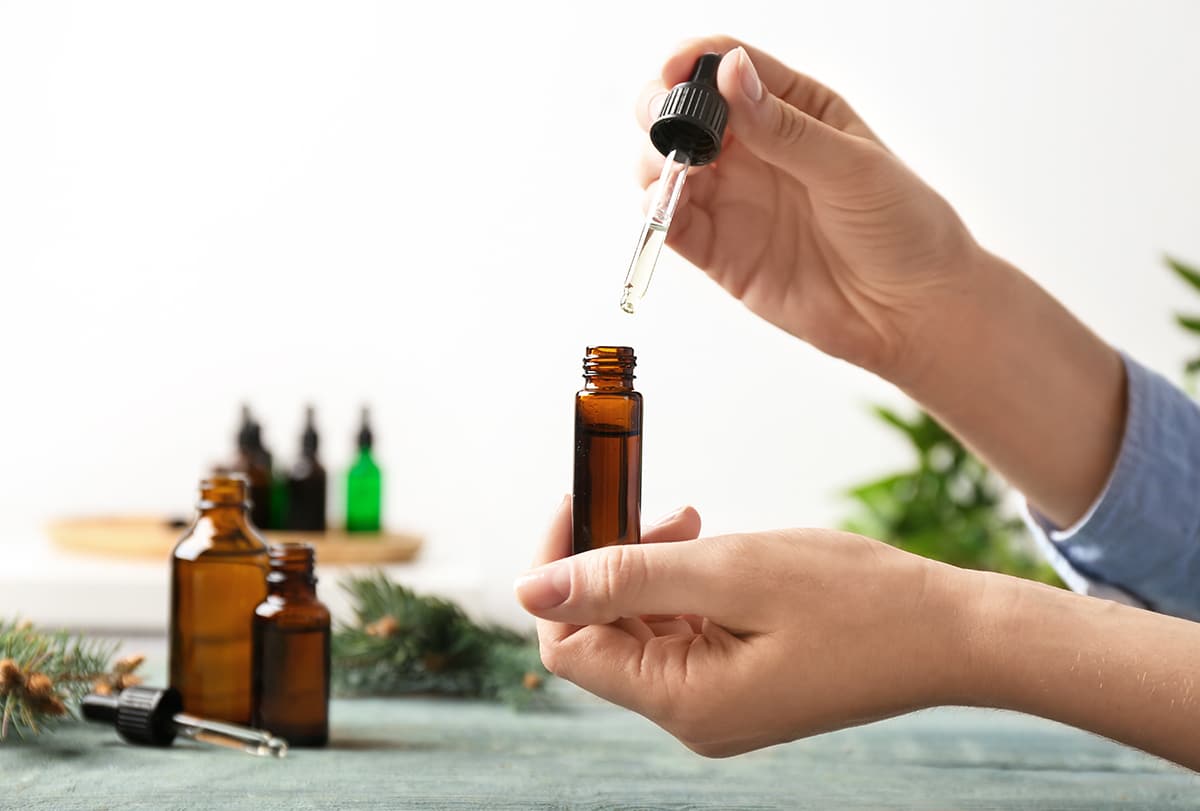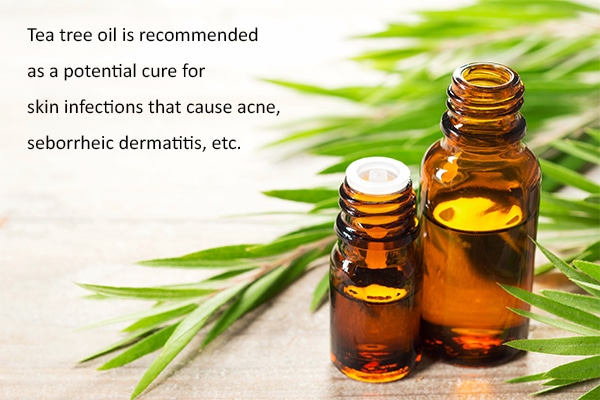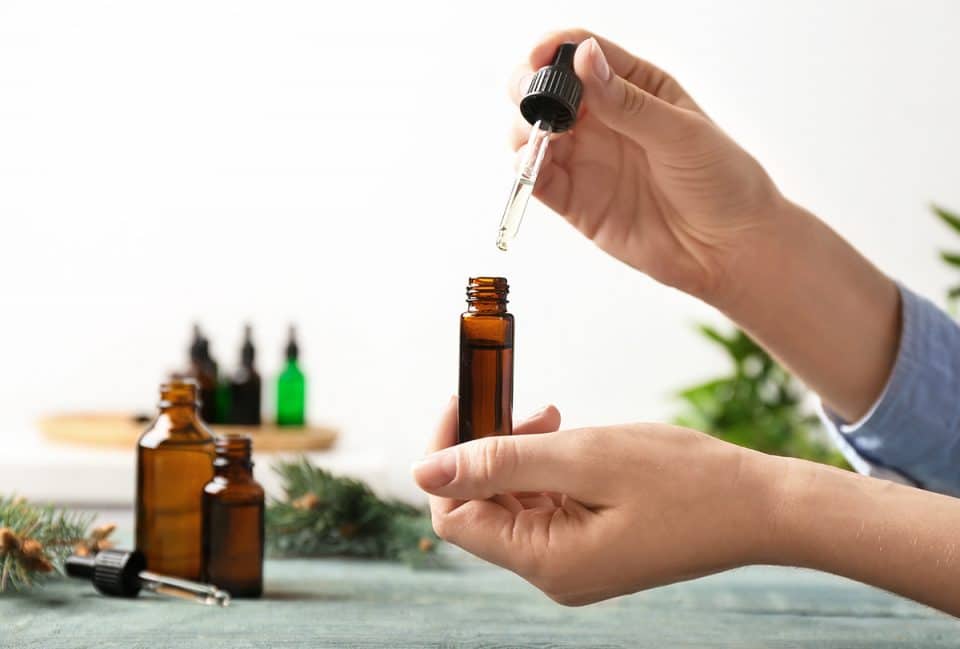Essential oils are plant extracts that contain all the natural compounds and properties of the plant. They are popularly used for medicinal purposes, aromatherapy, and skin care.

Read on to take a better look at essential oils and their dermatological uses. (1)
Why Use Essential Oils for Skin Problems?
Essential oils are known for their natural antioxidant and therapeutic qualities. They have been widely used in traditional medicine to cure diseases and infections, especially skin-related conditions.
Currently, around 100 essential oils are used in skin care. Most of these are recommended for the treatment of acne and other skin infections due to their potent antimicrobial and antiseptic properties.
Note: Always perform a patch test before using essential oils as they are potent and can irritate the skin.
Some of the Best Essential Oils for Skin Problems
Here are some of the most widely used essential oils for treating skin issues:
1. Tea tree oil for sensitive skin and acne

Tea tree oil is one of the most popular essential oils. It contains a compound called terpinen-4-ol, which exhibits strong antimicrobial and anti-inflammatory qualities.
Hence, tea tree oil is recommended as a potential cure for skin infections that cause acne, seborrheic dermatitis, etc. (2)(3)
How to use:
2. Lavender essential oil for wound healing
Lavender essential oil is another potent remedy for skin infections (especially those caused by fungi). (4)
Lavender has been used in many Asian and European countries since ancient times to promote wound healing and skin regeneration. (5) It contains strong antioxidant and anti-inflammatory properties. (6)
How to use:
- Mix a few drops of lavender essential oil with 1 teaspoon of carrier oil.
- Apply the mixture to your skin.
- Let it rest for 10 minutes before washing off.
- Repeat at least twice a day.
3. Chamomile oil for dry skin
Chamomile is a medicinal herb known for its calming properties. It has powerful anti-inflammatory, antiseptic, and analgesic (pain-relieving) qualities.
Hence, chamomile can help provide relief from skin inflammation and irritation in people suffering from acne, dermatitis, rashes, and other skin infections. (7)(8)
How to use:
- Add a couple of drops of chamomile oil to ½ tablespoon of any carrier oil.
- Massage it on the affected skin.
- Repeat twice a day.
4. Eucalyptus oil for skin allergies, bruises, cuts, and wounds
Eucalyptus oil is another popular traditional medicine remedy for several ailments. It contains antioxidant, anti-allergic, and anti-inflammatory properties that can help provide quick relief from painful wounds and bruises.
An active compound, 1,8-cineole is present in eucalyptus oil and helps suppress allergic reactions and heal skin allergies. (9)
How to use:
- Dilute eucalyptus oil with a carrier oil such as coconut or olive oil.
- Apply it to the affected area.
5. Lemon grass oil for fungal infections
Lemongrass oil contains citral, a compound that has antifungal and antibacterial properties. It is used in many natural skin care formulations to treat acne and other conditions. (10)
How to use:
- Add lemongrass oil to your bath water to help treat fungal infections.
- Alternatively, add a few drops of lemongrass oil to a carrier oil and apply the mixture to the affected area twice a day.
6. Peppermint essential oil for sunburn
Peppermint essential oil contains anti-inflammatory and antioxidant properties that can help soothe irritated skin. It also has a high SPF value and protects your skin from sunburn.
How to use:
- Mix a few drops of peppermint oil with coconut oil.
- Apply the mixture to areas affected by sunburn to promote healing.
7. Geranium essential oil for wrinkles
Geranium essential oil is filled with many antioxidants and anti-inflammatory compounds such as geraniol and citronellol. (11)
It can help preserve the elasticity of your skin, promote collagen synthesis, and prevent wrinkles. It has also been found to be useful in treating skin conditions such as eczema and dermatitis. (12)
How to use:
- Add 3–4 drops of geranium oil to a carrier oil such as coconut oil.
- Massage this mixture over the affected area twice a day.
8. Juniper essential oil for cellulite
Juniper essential oil is touted as a natural way to prevent fat accumulation and cellulite in women. It also helps fight inflammation and fungal infections. (13)
How to use:
- Add a few drops of juniper essential oil to 1 tablespoon of coconut oil.
- Massage the mixture on the affected area.
Things to Know When Using Essential Oils
Keep these things in mind when using essential oils:
- Essential oils are highly concentrated and can be harsh on the skin. Always dilute them with a carrier oil before application.
- Make sure that the essential oils you are using are authentic as they are usually not regulated by the FDA. Buy them from trusted sources only.
- Always perform a patch test before applying essential oils to your skin.
Final Word
Essential oils have become the new rage in skin care town. Although they have been around for ages, there has recently been an upsurge in their popularity and sales.
Essential oils have natural anti-inflammatory and antioxidant properties. They help fight infections and treat a number of skin conditions from allergies to acne.

